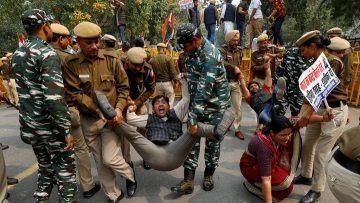Yasmeen Serhan in The Atlantic:
 Violence has become a familiar feature of many of the places convulsed by protests around the world—especially when the government gets involved. Such is the case in France, where clashes with police have resulted in numerous injuries. In Iraq and Chile, they have even led to deaths. The unrest emerging in India, however, is of a different breed. There, the sectarian violence that has resulted in dozens of deaths in the capital city of Delhi follows months of peaceful protests against a new citizenship law. In this case, it wasn’t a government crackdown that spurred the deaths, but rather, the government’s seeming unwillingness to quell the rampage in the first place.
Violence has become a familiar feature of many of the places convulsed by protests around the world—especially when the government gets involved. Such is the case in France, where clashes with police have resulted in numerous injuries. In Iraq and Chile, they have even led to deaths. The unrest emerging in India, however, is of a different breed. There, the sectarian violence that has resulted in dozens of deaths in the capital city of Delhi follows months of peaceful protests against a new citizenship law. In this case, it wasn’t a government crackdown that spurred the deaths, but rather, the government’s seeming unwillingness to quell the rampage in the first place.
The scale of the violence in Delhi, and Prime Minister Narendra Modi’s muted reaction to it, raises questions about the obligation of governments to stem violence. Is it enough to call for calm, as Modi has done, or is a more robust response required? Is failing to stamp out turmoil any different from being the cause of it in the first place? Compared with some mass demonstrations around the world, Delhi’s have been relatively peaceful. Galvanized by the passage of the Citizenship Amendment Act (CAA), which excludes Muslims from the list of religious groups in neighboring countries eligible for Indian citizenship, nationwide protests have largely centered on the law’s constitutionality and what it means for India’s identity. Critics argue that the law implicitly makes religion a criterion for nationality, thereby threatening the country’s status as a secular and pluralist democracy. In Delhi, this opposition has manifested in sit-ins, candlelight vigils, and public readings of the preamble to the Indian constitution.
More here.
